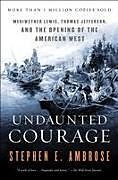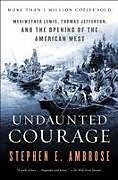Undaunted Courage
Einband:
Kartonierter Einband
EAN:
9780684826974
Untertitel:
Meriwether Lewis, Thomas Jefferson, and the Opening of the American West
Genre:
Geschichte
Autor:
Stephen E Ambrose
Herausgeber:
Gallery
Anzahl Seiten:
521
Erscheinungsdatum:
02.06.1997
ISBN:
978-0-684-82697-4
A chronicle of the two-and-a-half year journey of Lewis and Clark covers their incredible hardships and the contributions of Sacajawea
Autorentext
Stephen E. Ambrose was a renowned historian and acclaimed author of more than thirty books. Among his New York Times bestsellers are Nothing Like It in the World, Citizen Soldiers, Band of Brothers, D-Day - June 6, 1944, and Undaunted Courage. Dr. Ambrose was a retired Boyd Professor of History at the University of New Orleans and a contributing editor for the Quarterly Journal of Military History.
Klappentext
From the bestselling author of "D-Day" comes the definitive book on the most momentous expedition in American history--and one of the greatest adventure stories of all time. "An adventure filled with high romance and personal tragedy, involving the greatest expedition ever undertaken in the history of this country".--Alexander Theroux, "Chicago Tribune". Illustrations throughout. Maps.
Leseprobe
Chapter 1
Youth 1774-1792
From the west-facing window of the room in which Meriwether Lewis was born on August 18, 1774, one could look out at Rockfish Gap, in the Blue Ridge Mountains, an opening to the West that invited exploration. The Virginia Piedmont of 1774 was not the frontier -- that had extended beyond the Allegheny chain of mountains, and a cultured plantation life was nearly a generation old -- but it wasn´t far removed. Traces of the old buffalo trail that led up Rockfish River to the Gap still remained. Deer were exceedingly plentiful, black bear common. An exterminating war was being waged against wolves. Beaver were on every stream. Flocks of turkeys thronged the woods. In the fall and spring, ducks and geese darkened the rivers.
Lewis was born in a place where the West invited exploration but the East could provide education and knowledge, where the hunting was magnificent but plantation society provided refinement and enlightenment, where he could learn wilderness skills while sharpening his wits about such matters as surveying, politics, natural history, and geography.
The West was very much on Virginians´ minds in 1774, even though the big news that year was the Boston Tea Party, the introduction of resolutions in the House of Burgesses in support of Massachusetts, the dissolution of the Burgesses by the Royal Governor Lord Dunmore, and a subsequent meeting at Raleigh Tavern of the dissolved Burgesses, whose Committee of Correspondence sent out letters calling for a general congress of the American colonies. In September, the First Continental Congress met in Philadelphia, and revolution was under way.
Lord Dunmore was a villain in the eyes of the revolutionaries. He was eventually forced to flee Virginia and take up residence on a British warship. But in January 1774, he had done Virginia a big favor by organizing an offensive into the Ohio country by Virginia militia. The Virginians goaded Shawnee, Ottawa, and other tribes into what became Lord Dunmore´s War, which ended with the Indians defeated. They ceded hunting rights in Kentucky to the Virginians and agreed to unhindered access to and navigation on the Ohio River. Within six months, the Transylvania Company sent out Daniel Boone to blaze a trail through the Cumberland Gap to the bluegrass country of Kentucky.
Meanwhile, the British government, in the Quebec Act of 1774, moved to stem the flow of Virginians across the mountains, by extending the boundary of Canada south to the Ohio River. This cut off Virginia´s western claims, threatened to spoil the hopes and schemes of innumerable land speculators, including George Washington, and established a highly centralized crown-controlled government with special privileges for the Catholic Church, provoking fear that French Canadians, rather than Protestant Virginians, would rule in the Ohio Valley. This was one of the so-called Intolerable Acts that spurred the revolution.
Meriwether Lewis was born on the eve of revolution into a world of conflict between Americans and the British government for control of the trans-Appalachian West in a colony whose western ambitions were limitless, a colony that was leading the surge of Americans over the mountains, and in a county that was a nursery of explorers.
His family had been a part of the western movement from the beginning. Thomas Jefferson described Lewis´s forebears as "one of the distinguished families" of Virginia, and among the earliest. The first Lewis to come to America had been Robert, a Welshman and an officer in the British army. The family coat of arms was "Omne Solum Forti Patria Est," or "All Earth Is to a Brave Man His Country." (An alternate translation is "Everything the Brave Man Does Is for His Country.") Robert arrived in 1635 with a grant from the king for 33,333 1/3 acres of Virginia land. He had numerous progeny, including Colonel Robert Lewis, who was wonderfully successful on the Virginia frontier of the eighteenth century, in Albemarle County. On his death, Colonel Lewis was wealthy enough to leave all nine of his children with substantial plantations. His fifth son, William, inherited 1,896 acres, and slaves, and a house, Locust Hill, a rather rustic log home, but very comfortable and filled with things of value, including much table silver. It was just seven miles west of Charlottesville, within sight of Monticello.
One of the Lewis men, an uncle of Meriwether Lewis´s father, was a member of the king´s council; another, Fielding Lewis, married a sister of George Washington. Still another relative, Thomas Lewis, accompanied Jefferson´s father, Peter, on an expedition in 1746 into the Northern Neck, between the Potomac and the Rappahannock. Thomas was the first Lewis to keep a journal of exploration. He had a gift for vivid descriptions, of horses "tumbling over Rocks and precipices," of cold, rain, and near-starvation. He wrote of exultation over killing "one old Bair & three Cubs." He described a mountain area where they were so "often in the outmoust Danger this tirable place was Calld Purgatory." One river was so treacherous they named it Styx, "from the Dismal appearance of the place Being Sufficen to Strick terror in any human Creature."
In 1769, William Lewis, then thirty-one years old, married his cousin, twenty-two-year-old Lucy Meriwether. The Meriwether family was also Welsh and also land-rich -- by 1730, the family held a tract near Charlottesville of 17,952 acres. The coat of arms was "Vi et Consilio," or "Force and Counsel." George R. Gilmer, later a governor of Georgia, wrote of the family, "None ever looked at or talked with a Meriwether but he heard something which made him look or listen again." Jefferson said of Colonel Nicholas Meriwether, Lucy´s father, "He was the most sensible man I ever knew." He had served as commander of a Virginia regiment in Braddock´s disastrous campaign of 1755.
The Lewis and Meriwether families had long been close-knit and interrelated. Indeed, there were eleven marriages joining Lewises and Meriwethers between 1725 and 1774. Nicholas Meriwether II, 1667-1744, was the great-grandfather of Lucy Meriwether and the grandfather of William Lewis. The marriage of Lucy and William combined two bloodlines of unusual strength -- and some weaknesses. According to Jefferson, the family was "subject to hypocondriac affections. It was a constitutional disposition in all the nearer branches of the family."
Despite William Lewis´s tendency toward hypochondria -- or what Jefferson at other times called melancholy and would later be called depression -- Jefferson described his neighbor and friend as a man of "good sense, integrity, bravery, enterprize & remarkable bodily powers."
A year after their marriage, William and Lucy Lewis had their first child, a da…

Leider konnten wir für diesen Artikel keine Preise ermitteln ...
billigbuch.ch sucht jetzt für Sie die besten Angebote ...
Die aktuellen Verkaufspreise von 6 Onlineshops werden in Realtime abgefragt.
Sie können das gewünschte Produkt anschliessend direkt beim Anbieter Ihrer Wahl bestellen.
Loading...
Die aktuellen Verkaufspreise von 6 Onlineshops werden in Realtime abgefragt.
Sie können das gewünschte Produkt anschliessend direkt beim Anbieter Ihrer Wahl bestellen.
| # | Onlineshop | Preis CHF | Versand CHF | Total CHF | ||
|---|---|---|---|---|---|---|
| 1 | Seller | 0.00 | 0.00 | 0.00 |
